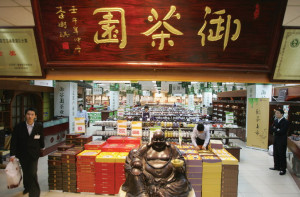
This was the reason for holding the “Presentation of Tea Cultivation and an Invitation to the 2015 Chinese International Tea Fair” in Moscow this October. The event was organised at the initiative of the major Chinese tea-producing companies from Hubei province. Representatives of the Russian tea industry, including Ramaz Chanturiya, head of the Association of Tea and Coffee Makers “Roschaikofe,” were among the participants of the Presentation. One of the key features of the event was the speech of Mayor of Xianning, Mr. Ding Xiaoqiang.
Russian masters of the Chinese tea ceremony, who use the products demonstrated at the Presentation in their work, were also among the invited guests. “Chinese companies have just recently started to penetrate the Russian market, less than a year ago,” said Andrey Gretchin, a Tea Ceremony Master at the State Museum of Oriental Art (Moscow), “and they are winning it over by offering high-quality products at favorable prices.”
The total volume of capital circulating in the Chinese tea industry comes to 3 bn yuan (30 bn rubles), but only a third of the sales reaches foreign markets, while the major portion is consumed by domestic customers. Thus, increasing its share of exported tea is one of the Chinese tea market’s top priorities. And the potential consumers located along the route of the “Silk Road Economic Belt” are ideal candidates for the implementation of this goal. According to statistics, the share of tea amounts to 63% among other beverages consumed in Russia; on average Russians drink 1.5 cups of tea a day in comparison with Great Britain ranking first in the world among the countries-consum
The birthplace of tea, the Chinese city of Xianning with its population of 3 million, will be the departure point of the “tea railroad.” It is noteworthy that the name of the city comes from the ancient mystical Chinese Book of Changes and is translated as “Tranquility reigns in all kingdoms.” 60,000 ha of tea plantations are located here. In total, 1.8 ml ha of land are allocated for tea plantations in China.
There is one more “tea town” in Hubei province — Chibi City, whose tea enterprises also intend to promote their products on the Russian market. Tea from Chibi City is advertised as the “best tea in China.”
In total, 11 large Chinese tea corporations carry out their business operations in Hubei province.
Today 85% of the products present on the Russia tea market originate from India, Sri Lanka, Great Britain, Indonesia, Kenya, Bangladesh and a number of other countries, while only about 15% comes from China.
But in the last three years the popularity of tea produced by Chinese companies has been growing in Kalmykia, Kazakhstan and Buryatia. This is because Chinese tea is especially good for brewing with milk in accordance with ancient oriental tradition. That is why sales of Chinese tea are continuously expanding there, successfully supplanting competitors.
The idea of the creation of a “Tea Empire” in the Eurasian zone of the “Silk Road Economic Belt” was articulated by President of the People’s Republic of China Xi Jinping. While in Russia on an official visit, he delivered a speech dedicated to the “Great 17th Century Tea Route” in MGIMO University on March 23, 2013. In particular, he mentioned the long-standing relations between Russian merchants and Chinese tea producers. A 5-thousand-km-lo
The concept voiced by Xi Jinping was embodied in the creation of an international alliance of the cities of the “Great Tea Road.” On September 6, 2013, representatives of 15 Chinese, Mongolian and Russian towns signed a joint declaration on the creation of the alliance in the town of Erenhot (Inner Mongolia Autonomous Region, China). Cities of the following Chinese provinces have acceded to the alliance: Fujian, Jiangxi, Hunan, Hubei, Henan, Shanxi, Hebei provinces and the Inner Mongolia Autonomous Region. Mongolian Dzamyn Ude and Ulan Bator as well as Russian towns spread between Ulan-Ude and Irbit in the Sverdlovsk Region have also become members of the alliance.
As the Charter of the “Great Tea Road” alliance reads, its participants will “exert efforts for fostering tea-drinking culture; facilitate the prosperity and development of the cities situated along the “Great Tea Road”; will promote contacts and collaboration between these cities, specifically in the fields of trade and tourism.”
Chinese travel agencies have also expressed their interest in the project. For example, since the beginning of 2014 the total number of Chinese tourists who visited the Irkutsk Region has almost doubled in comparison with the previous year and exceeded 21 thousand people. It was largely due to the signing of a trilateral declaration on the establishment of an international project, the “China Caravan”, in March 2014, in Irkutsk by Russia, Mongolia and China.
In August 2015, Chinese tourists departed on the first 8-day railway tour along the Manchuria–Chita–
In conclusion it should be noted that the Chinese party is interested in the Russian market not only because of the new prospect for the proliferation of its tea products. As Mayor of Xianning, Ding Xiaoqiang, stated in his recent speech in Moscow, “We will be happy to be present along the entire 10-thousand-km tea transport route; we will be delighted to be present in the Russian expanses, on the shores of the Volga River, in the metropolitan Moscow and beautiful Saint Petersburg,” and, “we will be happy to gain access to Russian resources.” In other words, after China conquers the Russian tea market, there will be more attractive trade proposals coming from its eastern neighbor.
Sophia Pale, PhD, Research Fellow of the Center for South-East Asia, Australia and Oceania of the Institute of Oriental Studies of the Russian Academy of Sciences, exclusively for the online magazine “New Eastern Outlook.”
